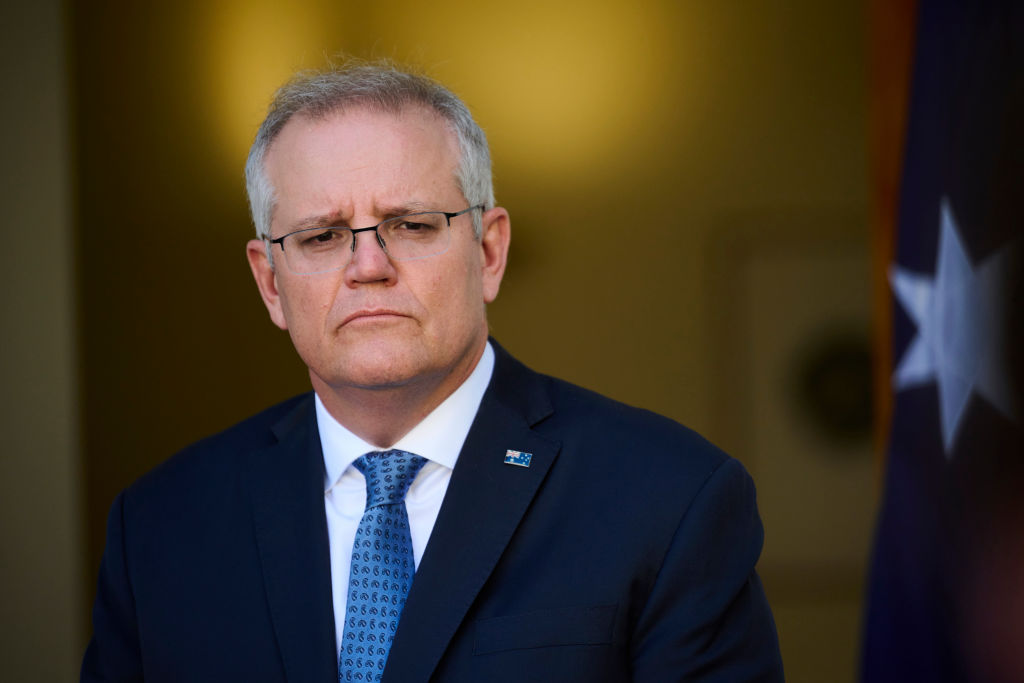Morrison’s imminent net-zero emissions announcement
Posted By Robert Glasser on October 6, 2021 @ 06:00

Within weeks, Prime Minister Scott Morrison will almost certainly announce an Australian commitment to achieve net-zero greenhouse gas emissions by 2050. He will do so with an eye to the domestic politics of the upcoming election, but also under pressure from key allies such as the United States.
Having committed to sharing sensitive nuclear submarine technology with Australia, Washington now will expect Canberra to contribute more on the climate front. In his recent meeting with the US president, it’s highly likely that Morrison reassured Joe Biden that Australia will sign up to net-zero emissions before the Glasgow climate conference, with the precise timing hinging on sensitive ongoing discussions within the Coalition. If so, it shouldn’t be surprising that climate change references in the AUSMIN and Quad joint statements mostly reflected Australia’s existing climate commitments or that the Americans refrained from publicly ramping up climate pressure during Morrison’s visit.
Recent reports also suggest that opposition to the climate commitment is diminishing [1] inside the Coalition. The PM’s negotiating position is reinforced by the fact that every state and territory has already committed to net zero by 2050. New South Wales also recently announced [2] that its 2030 emissions reduction target will increase from 35% to 50%.
Three related aspects of Morrison’s upcoming announcement will be key in terms of its credibility internationally and its domestic political impact, including on the election. The first concerns the nature and scale of the concessions Morrison makes to secure the support of his Coalition colleagues. Emissions are typically sorted into seven sectors across the economy, and Treasurer Josh Frydenberg [3] has said that reductions are needed in all of them, including mining and agriculture. These last two are areas that some National Party ministers are keen to protect. The credibility of the government’s net-zero commitment will be undermined if these sectors are excluded. It will also be undermined if securing the Coalition’s support comes at the cost of significant pork-barrel [4] funding to key Nationals constituencies.
The second aspect will be how ambitious the intermediate emissions reduction target is. A weak 2030 target will suggest the government is kicking the can down the road, and will call into question Australia’s ability to meet the 2050 deadline. Australia’s current commitment is to reduce greenhouse gases by 26–28% below 2005 levels by 2030. The PM is likely to increase that somewhat in his announcement, perhaps to 30–35%. US officials have suggested the figure should be closer to 50% [5], in line with the more ambitious targets set by many of our closest allies [6].
The third relates to how the government proposes to achieve the emissions reductions. It’s reasonable and responsible for the Coalition to choose measures that minimise the cost to the nation of achieving net zero. But the choices necessarily require many assumptions, including about the pace of technology development. Generally, the more the commitment relies on new or untested technologies, such as carbon capture and storage [7], the less credible [8] it will seem.
The US government invested billions of dollars in carbon-capture demonstration projects that were never completed and it recently suspended indefinitely its only commercial power plant using the technology. The same applies to relying heavily on carbon offsets [9] to achieve reductions. Carbon-offset schemes suffer from many flaws [10], including the absence of an official international standard for carbon accounting for the offsets. They are seen as a useful component of the response, but not as a substitute for deeper national reductions.
Australia’s action on climate change will certainly feature prominently in the election campaign, including these three aspects of the PM’s forthcoming net-zero announcement. Morrison has recently suggested that he may not attend the Glasgow conference because, as he put it [11], ‘I have to focus on things here and with COVID. Australia will be opening up around that time.’ If he doesn’t go, it will reinforce views in the electorate that the government isn’t taking climate change seriously. If Covid-19 is the reason he skips Glasgow, when so many other heads of state are attending, criticism of the government for the slow pace of the vaccine rollout could resurface. The political risks have further increased for Morrison with former PM Malcolm Turnbull’s and Fortescue Metals Group chief Andrew Forrest’s recent announcements that they’ll be attending the climate meeting.
Less than a year ago, it seemed almost inconceivable that this government would commit to achieving net-zero emissions by 2050. A number of factors have contributed to a change, including the election of Biden, the growing climate commitments of Australia’s key trading partners, the continuing rapid decreases in the costs of renewable energy and battery storage technologies, the commitment of financial regulators and the world’s largest asset managers to address climate risk and, of course, the rapidly increasing frequency and severity of global climate disruptions, including the Black Summer bushfires here in Australia, which directly affected almost 60% [12] of Australians.
The Australian public is increasingly concerned about climate change and calling for strong responses from the government. It remains to be seen if the electorate will view the PM’s plan for achieving net-zero emissions by 2050 as a sufficiently strong response to the climate threat.
Article printed from The Strategist: https://www.aspistrategist.org.au
URL to article: https://www.aspistrategist.org.au/morrisons-imminent-net-zero-emissions-announcement/
URLs in this post:
[1] diminishing: https://www.news.com.au/national/morrison-will-be-a-man-of-his-word-regarding-netzero-plan-littleproud/video/9aaad9a06fdd1178f4c2dbda5bdaab22
[2] announced: https://www.afr.com/politics/federal/nsw-coalition-backs-50pc-emission-reduction-by-2030-20210928-p58vao
[3] Josh Frydenberg: https://www.abc.net.au/news/2021-09-24/treasurer-backs-net-zero-2050-target/100489434
[4] pork-barrel: https://www.anao.gov.au/work/performance-audit/award-funding-under-the-community-sport-infrastructure-program
[5] 50%: https://www.theguardian.com/environment/2021/aug/12/senior-us-climate-official-says-australias-climate-targets-are-not-sufficient
[6] allies: https://ec.europa.eu/clima/policies/eu-climate-action/2030_ctp_en
[7] carbon capture and storage: https://cen.acs.org/environment/greenhouse-gases/Capturing-carbon-save-us/97/i8
[8] less credible: https://www.afr.com/policy/energy-and-climate/forrest-slams-carbon-capture-as-failed-technology-20211002-p58wne
[9] carbon offsets: https://www.energetics.com.au/insights/thought-leadership/carbon-offsets-approach-with-caution
[10] flaws: https://qz.com/2009746/not-all-carbon-offsets-are-a-scam-but-many-still-are/
[11] as he put it: https://www.smh.com.au/environment/climate-change/an-australian-no-show-at-cop26-would-stand-out-20210927-p58v6b.html
[12] 60%: https://www.theguardian.com/australia-news/2020/jan/23/bushfire-crisis-more-than-half-of-all-australians-found-to-have-been-directly-affected
Click here to print.